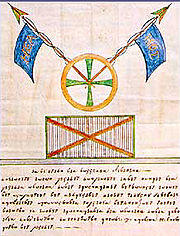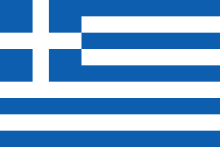Eleftheria i thanatos (Greek: Ελευθερία ή θάνατος, [elefθeˈri.a i ˈθanatos] 'Freedom or Death') is the motto of Greece.[1][2] It originated in the Greek songs of resistance that were powerful motivating factors for independence. It was adopted in 1814 by the Filiki Eteria, a secret organization formed specifically for the overthrow of Ottoman rule.
Overview
The motto arose during the Greek War of Independence in the 1820s, where it was a war cry for the Greeks who rebelled against Ottoman rule.[3] It was adopted after the Greek War of Independence and is still in use today. One explanation for the 9 stripes on the Greek flag is that they represent the nine syllables of the motto, five blue stripes for the syllables Eleftheria [e.lef.θeˈri.a] and four white stripes for i thanatos [i ˈθa.na.tos].[4][5] The motto symbolized and still symbolizes the resolve of the people of Greece against tyranny and oppression.
Part of the emblem of the Filiki Eteria were two flags with the letters ΗΕΑ and ΗΘΣ; These represent Ή ΕλευθερίΑ Ή ΘάνατοΣ, 'Either Freedom, or Death'.[6][7] This is also the motto of the 4th Infantry Division of the Greek Army.[8]

Cultural references
Nikos Kazantzakis' novel Captain Michalis was subtitled Freedom or Death, which became its title in the United States, Germany, France, and other countries.
See also
- Give me liberty, or give me death!
- God Save the South, whose lyrics contain the battle cry "Freedom or death!"
- Greek War of Independence
- Hymn to Liberty
- Liberté, égalité, fraternité
- Live free or die
- Thanatos
References
- ^ Pedersen, Christian Fogd (1971). The International Flag Book in Color. Morrow. p. 166.
- ^ Crampton, William (1991). Complete Guide to Flags. Gallery Books. p. 57. ISBN 0-8317-1605-3.
- ^ "Greek Independence Day". www.britannica.com. Retrieved 2009-09-09.
The Greek revolt was precipitated on March 25, 1821, when Bishop Germanos of Patras raised the flag of revolution over the Monastery of Agia Lavra in the Peloponnese. The cry “Freedom or Death” became the motto of the revolution. The Greeks experienced early successes on the battlefield, including the capture of Athens in June 1822, but infighting ensued.
- ^ Hinde, Robert A.; Watson, Helen (1995). War: A Cruel Necessity?: the Bases of Institutionalized Violence. I.B. Tauris. p. 55. ISBN 1-85043-824-2.
- ^ Smith, Whitney (2001). Flag Lore of All Nations. Milbrook Press. p. 40. ISBN 0-7613-1753-8.
- ^ Greek Army website
- ^ FHW-Membership card of the Philiki Etaireia
- ^ Greek Army website
